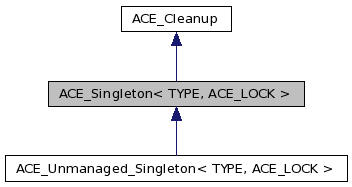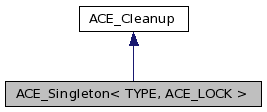A Singleton Adapter uses the Adapter pattern to turn ordinary classes into Singletons optimized with the Double-Checked Locking optimization pattern. More...
#include <Singleton.h>


Public Member Functions | |
| virtual void | cleanup (void *param=0) |
Static Public Member Functions | |
| static TYPE * | instance (void) |
| Global access point to the Singleton. | |
| static void | close (void) |
| Explicitly delete the Singleton instance. | |
| static void | dump (void) |
| Dump the state of the object. | |
Protected Member Functions | |
| ACE_Singleton (void) | |
| Default constructor. | |
Static Protected Member Functions | |
| static ACE_Singleton< TYPE, ACE_LOCK > *& | instance_i (void) |
| Get pointer to the Singleton instance. | |
Protected Attributes | |
| TYPE | instance_ |
| Contained instance. | |
Static Protected Attributes | |
| static ACE_Singleton< TYPE, ACE_LOCK > * | singleton_ = 0 |
| Pointer to the Singleton (ACE_Cleanup) instance. | |
A Singleton Adapter uses the Adapter pattern to turn ordinary classes into Singletons optimized with the Double-Checked Locking optimization pattern.
This implementation is a slight variation on the GoF Singleton pattern. In particular, a single <ACE_Singleton<TYPE, ACE_LOCK> > instance is allocated here, not a <TYPE> instance. The reason for this is to allow registration with the ACE_Object_Manager, so that the Singleton can be cleaned up when the process exits. For this scheme to work, a (static) cleanup() function must be provided. ACE_Singleton provides one so that TYPE doesn't need to. If you want to make sure that only the singleton instance of <T> is created, and that users cannot create their own instances of <T>, do the following to class <T>: (a) Make the constructor of <T> private (or protected) (b) Make Singleton a friend of <T> Here is an example:
* class foo
* {
* friend class ACE_Singleton<foo, ACE_Null_Mutex>;
* private:
* foo () { cout << "foo constructed" << endl; }
* ~foo () { cout << "foo destroyed" << endl; }
* };
* typedef ACE_Singleton<foo, ACE_Null_Mutex> FOO;
* Definition at line 79 of file Singleton.h.
| ACE_Singleton< TYPE, ACE_LOCK >::ACE_Singleton | ( | void | ) | [protected] |
| void ACE_Singleton< TYPE, ACE_LOCK >::cleanup | ( | void * | param = 0 |
) | [virtual] |
Cleanup method, used by ace_cleanup_destroyer to destroy the ACE_Singleton.
Reimplemented from ACE_Cleanup.
Definition at line 109 of file Singleton.cpp.
{
ACE_Object_Manager::remove_at_exit (this);
delete this;
ACE_Singleton<TYPE, ACE_LOCK>::instance_i () = 0;
}
| void ACE_Singleton< TYPE, ACE_LOCK >::close | ( | void | ) | [static] |
Explicitly delete the Singleton instance.
Reimplemented in ACE_Unmanaged_Singleton< TYPE, ACE_LOCK >.
Definition at line 117 of file Singleton.cpp.
{
ACE_Singleton<TYPE, ACE_LOCK> *&singleton =
ACE_Singleton<TYPE, ACE_LOCK>::instance_i ();
if (singleton)
{
singleton->cleanup ();
ACE_Singleton<TYPE, ACE_LOCK>::instance_i () = 0;
}
}
| class ACE_LOCK void ACE_Singleton< TYPE, ACE_LOCK >::dump | ( | void | ) | [static] |
Dump the state of the object.
Reimplemented in ACE_Unmanaged_Singleton< TYPE, ACE_LOCK >.
Definition at line 29 of file Singleton.cpp.
{
#if defined (ACE_HAS_DUMP)
ACE_TRACE ("ACE_Singleton<TYPE, ACE_LOCK>::dump");
#if !defined (ACE_LACKS_STATIC_DATA_MEMBER_TEMPLATES)
ACE_DEBUG ((LM_DEBUG, ACE_TEXT ("instance_ = %x"),
ACE_Singleton<TYPE, ACE_LOCK>::instance_i ()));
ACE_DEBUG ((LM_DEBUG, ACE_END_DUMP));
#endif /* ACE_LACKS_STATIC_DATA_MEMBER_TEMPLATES */
#endif /* ACE_HAS_DUMP */
}
| TYPE * ACE_Singleton< TYPE, ACE_LOCK >::instance | ( | void | ) | [static] |
Global access point to the Singleton.
Reimplemented in ACE_Unmanaged_Singleton< TYPE, ACE_LOCK >.
Definition at line 57 of file Singleton.cpp.
{
ACE_TRACE ("ACE_Singleton<TYPE, ACE_LOCK>::instance");
ACE_Singleton<TYPE, ACE_LOCK> *&singleton =
ACE_Singleton<TYPE, ACE_LOCK>::instance_i ();
// Perform the Double-Check pattern...
if (singleton == 0)
{
if (ACE_Object_Manager::starting_up () ||
ACE_Object_Manager::shutting_down ())
{
// The program is still starting up, and therefore assumed
// to be single threaded. There's no need to double-check.
// Or, the ACE_Object_Manager instance has been destroyed,
// so the preallocated lock is not available. Either way,
// don't register for destruction with the
// ACE_Object_Manager: we'll have to leak this instance.
ACE_NEW_RETURN (singleton, (ACE_Singleton<TYPE, ACE_LOCK>), 0);
}
else
{
#if defined (ACE_MT_SAFE) && (ACE_MT_SAFE != 0)
// Obtain a lock from the ACE_Object_Manager. The pointer
// is static, so we only obtain one per ACE_Singleton
// instantiation.
static ACE_LOCK *lock = 0;
if (ACE_Object_Manager::get_singleton_lock (lock) != 0)
// Failed to acquire the lock!
return 0;
ACE_GUARD_RETURN (ACE_LOCK, ace_mon, *lock, 0);
if (singleton == 0)
{
#endif /* ACE_MT_SAFE */
ACE_NEW_RETURN (singleton, (ACE_Singleton<TYPE, ACE_LOCK>), 0);
// Register for destruction with ACE_Object_Manager.
ACE_Object_Manager::at_exit (singleton, 0, typeid (TYPE).name ());
#if defined (ACE_MT_SAFE) && (ACE_MT_SAFE != 0)
}
#endif /* ACE_MT_SAFE */
}
}
return &singleton->instance_;
}
| ACE_Singleton< TYPE, ACE_LOCK > *& ACE_Singleton< TYPE, ACE_LOCK >::instance_i | ( | void | ) | [static, protected] |
Get pointer to the Singleton instance.
Reimplemented in ACE_Unmanaged_Singleton< TYPE, ACE_LOCK >.
Definition at line 43 of file Singleton.cpp.
{
#if defined (ACE_LACKS_STATIC_DATA_MEMBER_TEMPLATES)
// Pointer to the Singleton instance. This works around a bug with
// G++ and it's (mis-)handling of templates and statics...
static ACE_Singleton<TYPE, ACE_LOCK> *singleton_ = 0;
return singleton_;
#else
return ACE_Singleton<TYPE, ACE_LOCK>::singleton_;
#endif /* ACE_LACKS_STATIC_DATA_MEMBER_TEMPLATES */
}
TYPE ACE_Singleton< TYPE, ACE_LOCK >::instance_ [protected] |
Contained instance.
Definition at line 100 of file Singleton.h.
ACE_Singleton< TYPE, ACE_LOCK > * ACE_Singleton< TYPE, ACE_LOCK >::singleton_ = 0 [static, protected] |
Pointer to the Singleton (ACE_Cleanup) instance.
Reimplemented in ACE_Unmanaged_Singleton< TYPE, ACE_LOCK >.
Definition at line 104 of file Singleton.h.
 1.7.0
1.7.0